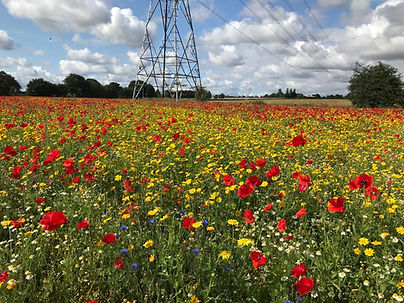I'm Tim Parton, and I've been the farm manager of Brewood Park Farm, located in South Staffordshire, just north of Wolverhampton, since 2003.
When I started working the land, I loved the soil and could never understand why we were willing to damage and disrespect it to such an extent. The soil is a finite resource; without good soil, we are nothing. Soil is our most natural resource, and it is time that we started looking after it, which is why I do what I do as a farmer. Intelligent farming is patient farming, where we don't go out in unsuitable conditions, compacting the soil and removing the most vital part of it: air. You only have to look at the amount of topsoil that we see in waterways to know that we are destroying this incredible asset, and it was this that told me that there had to be another way.


Nature has been covering soil and preserving its health for millions of years. It’s time we learn from this wisdom. On my farm, I work with nature, not against it. We must shed the belief that we know better and instead follow the natural order. This approach is not only kinder to the earth, but it also benefits the farmer in the long run. As history has shown, battling against nature is exhausting and ultimately a losing fight. It’s time to go with the flow and farm in harmony with the environment.
Rethinking chemical farming
For too long, chemical farming has focused on short-term solutions, treating the symptoms of unhealthy soil rather than addressing the root causes. We're seeing the consequences: depleted soils and increased atmospheric carbon. It's time for a change. We need to restore carbon into the soil and work in partnership with nature, including the vital insects and organisms that our soils depend on.
We must acknowledge that multinational corporations have dominated agriculture, prioritising profits above our soil's health and farmers' well-being. The high chemical input system they advocate benefits chemical manufacturers at the expense of farmers. It's time to shift away from this model and towards sustainable practices that support both the land and those who work it.
The case against overusing inputs
Switching to more intelligent farming practices brings back beneficial insects and birds, making the farm a delightful place once again. Plus, healthier soils mean we can drastically cut down on herbicide use. It's a situation where everyone, and the environment, wins.
We're entering a new age of farming. Essential nutrients like Phosphorus and Potassium are depleting—I haven't used them on my farm in over 12 years. We must forge a new way forward that secures our profits and our future. Overusing Phosphorus harms our soil and water, and ironically, much of it doesn't even help the crops. Surprisingly, most soils have enough Phosphorus naturally to last many generations; we just need to learn how to use that effectively.
The challenge of nutritional balance
Ignoring these significant issues is no longer an option—we must act.
Intelligent Farming is challenging; there's no standard guide to follow. It requires closely monitoring the crops through leaf testing and adapting our methods accordingly. Plus, unpredictable weather - from hot and dry to cold and wet conditions - complicates how we use soil life because plants need consistent growth for nutrition practices to be effective. If a plant's growth stalls, our efforts are less impactful.
At the heart of Intelligent Farming is achieving nutritional balance, not just in the soil but also crucially within the plant leaves themselves.
Ensuring sustainable practices
Let me clarify that I don't practice organic farming, nor am I aiming for it. Frankly, I don't believe organic farming alone can feed the world, and it's not practical for most farmers to operate at a loss.
Humans have made incredible advances, and I believe we can use them wisely. The guiding principle I use is "Does nature object?" If a practice is in harmony with nature, it's worth considering.
That said, humans can be incredibly destructive, the only species known to damage its own habitat. So, we must be thoughtful about what we use and strive for sustainability. It's true that nitrogen and phosphorus can pollute our waters, but outright bans aren't the solution. Proper timing, choosing the correct forms of nutrients, and ensuring plants or soils absorb them can mitigate these issues.
I prioritize soil health and environmental care in everything I do on the farm. The bird conservation group monitoring my land can attest to the positive effects. They're continually impressed by the thriving ecosystem here.
Profit and Sustainability
Being a farmer who cares for the environment is my passion, but making a profit is essential. Profitable farming allows for investment in the farm's future. Without it, environmental initiatives are often the first to be cut back.
One of my concerns with organic farming is that it typically yields less, which isn't the most efficient use of soil. More importantly, if it isn't profitable, it's not sustainable in the long term.
As the global population grows, the challenge to feed everyone increases. Currently, organic farming methods aren't able to meet this growing demand.